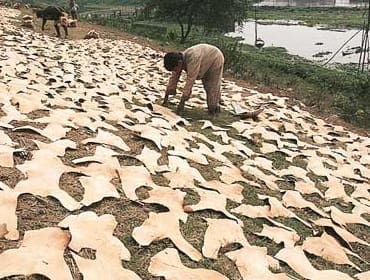Post lockdown, the Uttar Pradesh green panel has pared the operational capacity of Kanpur leather tanneries by 50 per cent to prevent the potential discharge of industrial effluents in river Ganga.
The UP Pollution Control Board (UPPCB) has issued a roster for 262 functional tanneries in Kanpur, under which half of the units would operate during the first fortnight of the month, while the remaining would operate in the second fortnight.
The pollution watchdog took this step in wake of the sudden “overflow” situation of the effluent treatment plant and the pumping stations in Kanpur after the tanneries were allowed to operate post-lockdown last month.
UPPCB was apprehensive that the effluents situation could deteriorate and overload the four pumping stations apart from the 36 million litres per day (MLD) capacity of the Common Effluent Treatment Plant (CETP) at Jajmau industrial area in Kanpur.
Kanpur leather industry, including tanneries and leather goods manufacturers, estimated at Rs 12,000 crore, provides direct and indirect employment to nearly a million people in Kanpur and Unnao districts. The cluster is estimated to generate Rs 6,000 crore worth of exports to the Gulf, Europe, China, Iran etc. However, the lockdown has taken the sail out of its winds.
“We were still trying to resume operations after the abrupt lockdown, when the fresh UPPCB directive was slapped on us,” Small Tanners’ Association member Nayyar Jamal told Business Standard.
While the roster plan has already been implemented, the Board officials are now conducting raids to ensure that the tanneries are functioning strictly according to the rotation timetable.
“We are taking all steps to curb potential overflow of untreated effluents by the tanneries and to prevent any discharge in the river,” UPPCB regional officer S B Franklin said.
He noted there had been instances when the pumping stations operated by the Jal Nigam got overloaded and in such a scenario, there is a possibility of the pollutants finding its way in river Ganga. “The roster has been issued for two months (June and July). After the rainy season, we will review the situation and issue fresh directives.”
Meanwhile, Jamal lamented the tanneries were also facing an acute shortage of labour owing to the exodus triggered by the lockdown. “Nearly half of the migrant labour employed in the Kanpur leather industry has gone back to their native states, primarily Bihar and Jharkhand. Only those workers, who are now permanently settled in Kanpur stayed back.”
Besides, the Kanpur leather industry is witnessing a dwindling order book, both from domestic and foreign customers. The tanneries supply finished leather for a wide variety of leather goods, including shoes, upholstery, apparels etc.
While, the upholstery leather catering the automobile and furnishing segments have fizzled out owing to lockdown, the tanneries are left to contend with the category of safety shoes used by the security forces, such as military, police etc.
The Kanpur leather industry is among the major suppliers for the leather belts, holster and horse saddles as well.
In the recent past, the tanneries in Kanpur have been subjected to a series of periodic closures, including Kumbh Mela 2019 and Magh Mela 2020 at Prayagraj (Allahabad) to ensure clean water in downstream river Ganga.

